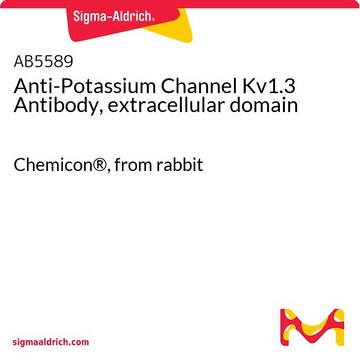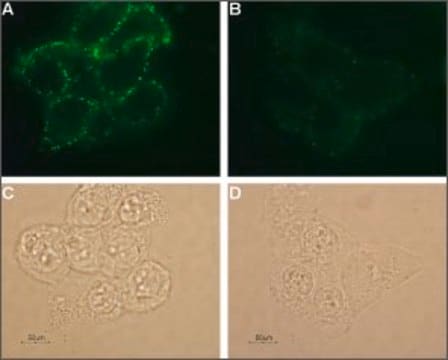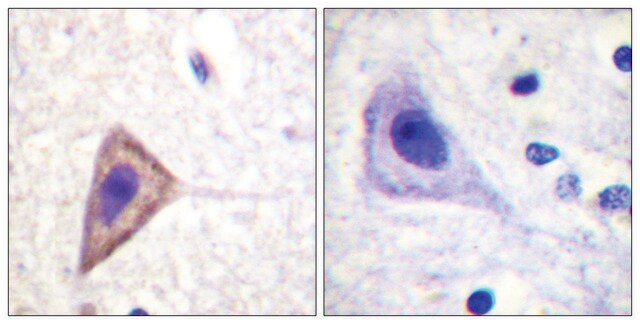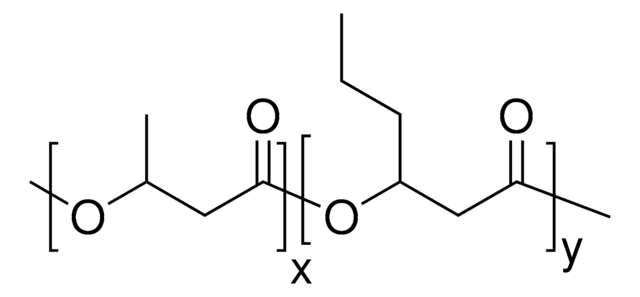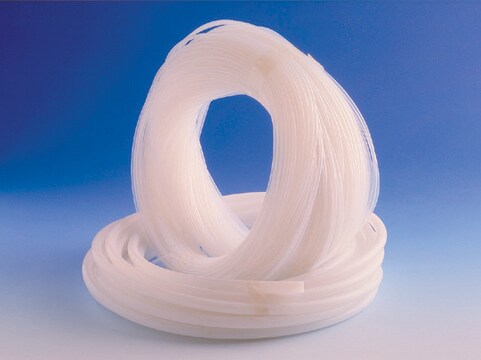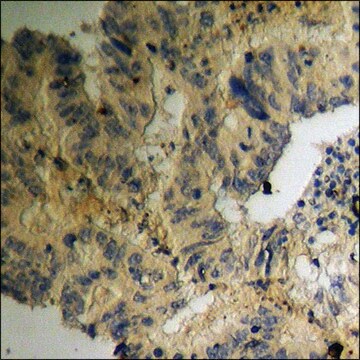AB5178
Przeciwciało przeciwko kanałowi potasowemu Kv1.3
Chemicon®, from rabbit
About This Item
Polecane produkty
pochodzenie biologiczne
rabbit
Poziom jakości
forma przeciwciała
affinity purified immunoglobulin
rodzaj przeciwciała
primary antibodies
klon
polyclonal
reaktywność gatunkowa
rat, mouse, human
producent / nazwa handlowa
Chemicon®
metody
immunohistochemistry: suitable
western blot: suitable
numer dostępu NCBI
numer dostępu UniProt
Warunki transportu
wet ice
docelowa modyfikacja potranslacyjna
unmodified
informacje o genach
human ... KCNA3(3738)
Opis ogólny
Specyficzność
Immunogen
Zastosowanie
Immunohistochemia na skrawkach mózgu szczura.
Rozcieńczenia należy wykonywać przy użyciu białka nośnikowego, takiego jak BSA (1-3%)
Optymalne rozcieńczenia robocze muszą być określone przez użytkownika końcowego.
Neuroscience
Ion Channels & Transporters
Powiązanie
Postać fizyczna
Przechowywanie i stabilność
Komentarz do analizy
ANTYGEN KONTROLNY: Do przeciwciała dołączono bezpłatnie 120 μg antygenu kontrolnego (liofilizowany proszek w soli fizjologicznej buforowanej fosforanami, pH 7,4, zawierający 5% sacharozy i 0,025% azydku sodu). Roztwór podstawowy antygenu można sporządzić przy użyciu 100 μl sterylnej wody dejonizowanej. W przypadku kontroli pozytywnej, w Western blot przy użyciu 20 ng białka na pas (minigel). W przypadku kontroli negatywnej, preinkubować 3-5 μg białka fuzyjnego z 1 μg przeciwciała przez godzinę w temperaturze pokojowej. Optymalne stężenia muszą być określone przez użytkownika końcowego.
Inne uwagi
Informacje prawne
Oświadczenie o zrzeczeniu się odpowiedzialności
Nie możesz znaleźć właściwego produktu?
Wypróbuj nasz Narzędzie selektora produktów.
Kod klasy składowania
11 - Combustible Solids
Klasa zagrożenia wodnego (WGK)
WGK 3
Certyfikaty analizy (CoA)
Poszukaj Certyfikaty analizy (CoA), wpisując numer partii/serii produktów. Numery serii i partii można znaleźć na etykiecie produktu po słowach „seria” lub „partia”.
Masz już ten produkt?
Dokumenty związane z niedawno zakupionymi produktami zostały zamieszczone w Bibliotece dokumentów.
Nasz zespół naukowców ma doświadczenie we wszystkich obszarach badań, w tym w naukach przyrodniczych, materiałoznawstwie, syntezie chemicznej, chromatografii, analityce i wielu innych dziedzinach.
Skontaktuj się z zespołem ds. pomocy technicznej